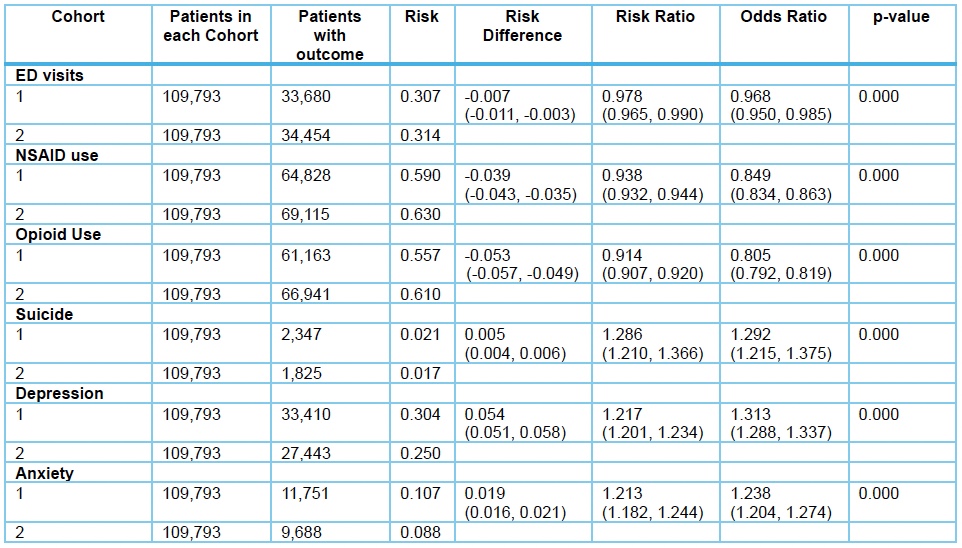Session Information
Date: Monday, October 27, 2025
Title: (1221–1247) Pain in Rheumatic Disease Including Fibromyalgia Poster
Session Type: Poster Session B
Session Time: 10:30AM-12:30PM
Background/Purpose: Fibromyalgia (FM) is a chronic, debilitating condition characterized by widespread pain, fatigue, and cognitive disturbances. Despite the availability of FDA-approved treatments, real-world comparative effectiveness data between duloxetine and pregabalin remain limited, particularly in diverse patient populations. Understanding which agent offers greater clinical durability and fewer adverse outcomes can inform personalized care in rheumatologic practice.This study aims to compare the real-world effectiveness, tolerability, and healthcare utilization associated with duloxetine and pregabalin among patients diagnosed with fibromyalgia using a large multicenter electronic health record database.
Methods: This is a retrospective cohort study utilizing data from the TriNetX Global Collaborative Network, encompassing over 144 healthcare organizations worldwide. Adult patients (≥18 years) with a diagnosis of fibromyalgia (ICD-10-CM: M79.7) who received either duloxetine (Cohort A: n = 194,834) or pregabalin (Cohort B: n = 114,556) were identified. Patients receiving both drugs were excluded. Propensity score matching (1:1 greedy nearest-neighbor) adjusted for age, sex, comorbidities, and baseline medication use. Primary outcome was treatment durability (time to discontinuation or switch) over 3 years. Secondary outcomes included pain-related ED visits, new-onset psychiatric diagnoses, and adverse event profiles.
Results: Post-matching, each cohort comprised 113,402 patients. Duloxetine demonstrated a significantly longer median time to treatment discontinuation (HR: 0.82; 95% CI: 0.79–0.85; p < 0.001) and fewer discontinuation/switch events within 12 months (24.3% vs. 30.9%). Duloxetine users also had reduced pain-related ED visits (RR: 0.76; 95% CI: 0.71–0.81), and lower incidence of new-onset anxiety/depression (p < 0.01). In contrast, pregabalin users reported fewer GI side effects but had higher risks of sedation and weight gain (OR: 1.34; 95% CI: 1.29–1.39). Subgroup analyses revealed that patients with pre-existing mood disorders benefited more from duloxetine, whereas pregabalin performed better in elderly populations and those with neuropathic comorbidities.
Conclusion: In one of the largest real-world analyses of fibromyalgia treatment to date, duloxetine was associated with superior treatment persistence, fewer acute care needs, and improved psychiatric outcomes compared to pregabalin. These results support a precision medicine approach in selecting pharmacologic therapy for FM and call for prospective trials targeting specific patient phenotypes to optimize treatment efficacy and tolerability.
 Table 1. Baseline Characteristics of Matched Fibromyalgia Patients Treated with Duloxetine vs. Pregabalin
Table 1. Baseline Characteristics of Matched Fibromyalgia Patients Treated with Duloxetine vs. Pregabalin
.jpg) Table 2: Duloxetine (1) and Pregabalin (2) comparison
Table 2: Duloxetine (1) and Pregabalin (2) comparison
To cite this abstract in AMA style:
Okeke C, Edwards Q, Mamoh U, Lam J, Uwakwe C. Comparative Effectiveness of Duloxetine versus Pregabalin in Fibromyalgia: A Large-Scale, Real-World Study Across 300,000 Patients [abstract]. Arthritis Rheumatol. 2025; 77 (suppl 9). https://acrabstracts.org/abstract/comparative-effectiveness-of-duloxetine-versus-pregabalin-in-fibromyalgia-a-large-scale-real-world-study-across-300000-patients/. Accessed .« Back to ACR Convergence 2025
ACR Meeting Abstracts - https://acrabstracts.org/abstract/comparative-effectiveness-of-duloxetine-versus-pregabalin-in-fibromyalgia-a-large-scale-real-world-study-across-300000-patients/
